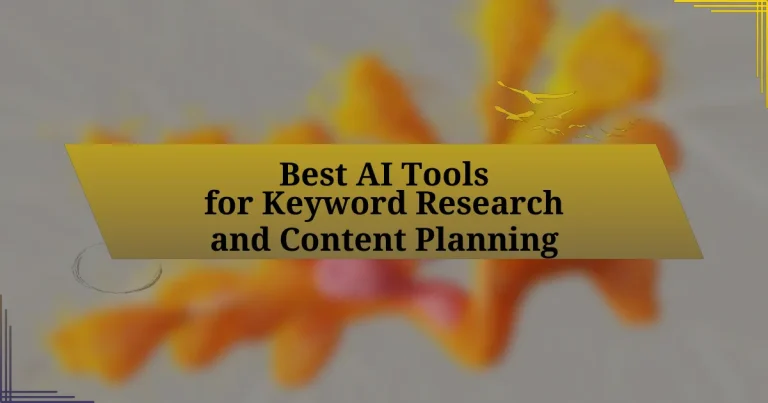The article focuses on the best AI tools for keyword research and content planning, highlighting prominent options such as Ahrefs, SEMrush, and Moz. It discusses how these tools enhance keyword analysis and content strategy development through advanced algorithms that analyze data for relevant keywords and trends. Key features of these tools include keyword suggestion, search volume data, and competition analysis, which are essential for effective SEO strategies. Additionally, the article addresses the importance of keyword research in content planning and its role in improving SEO success and content engagement. It also compares different AI tools based on functionality, pricing models, and suitability for various user levels, while providing best practices for maximizing their effectiveness.

What are the Best AI Tools for Keyword Research and Content Planning?
The best AI tools for keyword research and content planning include Ahrefs, SEMrush, and Moz. Ahrefs offers a comprehensive keyword explorer that provides search volume, keyword difficulty, and related keywords, making it a valuable resource for content strategists. SEMrush features a robust keyword research tool that analyzes competitors and identifies high-traffic keywords, while also offering content optimization suggestions. Moz provides a user-friendly interface with its Keyword Explorer, which helps users discover and prioritize keywords based on their potential impact. These tools are widely recognized in the industry for their accuracy and effectiveness in enhancing SEO strategies.
How do AI tools enhance keyword research and content planning?
AI tools enhance keyword research and content planning by utilizing advanced algorithms to analyze vast amounts of data, identifying relevant keywords and trends more efficiently than traditional methods. These tools can process search volume, competition, and user intent, allowing marketers to target specific audiences effectively. For instance, tools like Ahrefs and SEMrush provide insights into keyword difficulty and related terms, enabling content creators to optimize their strategies based on real-time data. Additionally, AI-driven content planning tools can suggest topics based on keyword analysis, ensuring that the content aligns with current market demands and user interests. This data-driven approach leads to more effective content strategies and improved search engine rankings.
What specific features do these AI tools offer for keyword analysis?
AI tools for keyword analysis offer features such as keyword suggestion, search volume data, competition analysis, and trend tracking. These features enable users to identify relevant keywords, assess their popularity, evaluate the competitiveness of those keywords, and monitor changes in keyword performance over time. For instance, tools like SEMrush provide detailed metrics on search volume and keyword difficulty, while Ahrefs offers insights into keyword trends and related keywords, allowing marketers to optimize their content strategies effectively.
How do AI tools improve content strategy development?
AI tools enhance content strategy development by providing data-driven insights that inform decision-making. These tools analyze vast amounts of data to identify trending topics, audience preferences, and optimal keywords, enabling marketers to create targeted content that resonates with their audience. For instance, tools like SEMrush and Ahrefs offer keyword analysis and competitive research, which help in understanding what content performs well in specific niches. Additionally, AI-driven content optimization tools, such as Clearscope, suggest relevant terms and phrases to improve SEO performance, ensuring that the content ranks higher in search engine results. This data-centric approach leads to more effective content strategies that align with market demands and user intent.
Why is keyword research important for content planning?
Keyword research is important for content planning because it identifies the terms and phrases that potential audiences are actively searching for, ensuring that content aligns with user intent. By understanding these keywords, content creators can optimize their material to increase visibility in search engines, leading to higher traffic and engagement. Research shows that 70% of marketers see keyword research as a critical part of their content strategy, as it helps in targeting the right audience and improving overall content effectiveness.
What role does keyword research play in SEO success?
Keyword research is essential for SEO success as it identifies the terms and phrases that potential customers use to search for products or services. By understanding these keywords, businesses can optimize their content to align with user intent, improving visibility in search engine results. According to a study by Ahrefs, 90.63% of web pages receive no organic traffic from Google, highlighting the importance of targeting the right keywords to drive traffic. Effective keyword research informs content strategy, enhances on-page optimization, and ultimately leads to higher rankings and increased conversions.
How can effective keyword research influence content engagement?
Effective keyword research significantly enhances content engagement by ensuring that the content aligns with the search intent of the target audience. When content creators utilize relevant keywords that reflect what users are actively searching for, it increases the likelihood of attracting organic traffic. According to a study by HubSpot, 75% of users never scroll past the first page of search results, highlighting the importance of optimizing content with effective keywords to improve visibility. This alignment not only drives more visitors to the content but also fosters higher engagement rates, as users find the information they are looking for, leading to longer time spent on the page and lower bounce rates.

What are the Top AI Tools Available for Keyword Research?
The top AI tools available for keyword research include Ahrefs, SEMrush, Moz, Ubersuggest, and Google Keyword Planner. Ahrefs offers comprehensive keyword analysis and competitive insights, while SEMrush provides extensive keyword tracking and SEO tools. Moz is known for its user-friendly interface and keyword suggestions, Ubersuggest offers affordable keyword ideas and SEO metrics, and Google Keyword Planner is a free tool that helps identify keyword volume and trends. These tools are widely recognized in the industry for their effectiveness in enhancing SEO strategies and content planning.
How do different AI tools compare in terms of functionality?
Different AI tools for keyword research and content planning vary significantly in functionality, with some focusing on data analysis while others emphasize content generation. For instance, tools like SEMrush and Ahrefs excel in providing comprehensive keyword analytics, including search volume, keyword difficulty, and competitive analysis, which are essential for effective SEO strategies. In contrast, tools such as Jasper and Copy.ai prioritize content creation, offering features that generate high-quality written content based on user prompts.
Moreover, tools like Moz provide a balance of both functionalities, offering keyword tracking alongside content optimization suggestions. The effectiveness of these tools can be validated by their user bases and industry reviews; for example, SEMrush is widely recognized for its extensive database and analytics capabilities, while Jasper has gained popularity for its user-friendly interface and content generation quality.
What are the unique features of popular AI keyword research tools?
Popular AI keyword research tools offer unique features such as advanced semantic analysis, competitive keyword insights, and automated content suggestions. Advanced semantic analysis enables these tools to understand user intent and context, allowing for more relevant keyword recommendations. Competitive keyword insights provide users with data on what keywords competitors are ranking for, helping to identify gaps and opportunities. Automated content suggestions streamline the content creation process by recommending topics and keywords based on current trends and search volume, enhancing overall SEO strategy. These features collectively improve keyword targeting and content planning efficiency.
Which AI tools are best suited for beginners versus advanced users?
For beginners, tools like Google Keyword Planner and AnswerThePublic are best suited due to their user-friendly interfaces and straightforward functionalities. These tools provide essential keyword insights without overwhelming users with complex features. In contrast, advanced users benefit from tools like SEMrush and Ahrefs, which offer in-depth analytics, competitive analysis, and extensive data sets. These advanced tools require a higher level of expertise to fully leverage their capabilities, making them ideal for users who need comprehensive keyword research and content planning features.
What are the pricing models for these AI tools?
The pricing models for AI tools used in keyword research and content planning typically include subscription-based, pay-per-use, and tiered pricing structures. Subscription-based models charge users a recurring fee, often monthly or annually, for access to the tool’s features and updates. Pay-per-use models allow users to pay only for the specific features or data they utilize, making it cost-effective for occasional users. Tiered pricing structures offer different levels of service at varying price points, enabling users to choose a plan that fits their needs and budget. These models are designed to accommodate a range of users, from individual content creators to large enterprises, ensuring flexibility and scalability in usage.
How do subscription costs vary among different AI tools?
Subscription costs for AI tools vary significantly based on features, usage limits, and target audience. For instance, basic AI writing tools may charge around $10 to $30 per month, while more advanced platforms with extensive features can range from $50 to $300 monthly. Additionally, enterprise-level solutions often have custom pricing that can exceed $1,000 per month, depending on the scale of usage and specific requirements. This variation reflects the differing capabilities and intended user bases of the tools, with more sophisticated options justifying higher costs through enhanced functionalities and support.
What free options are available for keyword research?
Free options available for keyword research include Google Keyword Planner, Ubersuggest, and AnswerThePublic. Google Keyword Planner allows users to discover new keywords and see estimated search volumes, making it a reliable tool for planning content. Ubersuggest provides keyword suggestions along with search volume data and competition analysis, which helps in identifying valuable keywords. AnswerThePublic visualizes search queries and questions related to keywords, offering insights into user intent. These tools are widely recognized for their effectiveness in aiding keyword research without any cost.

How to Effectively Use AI Tools for Content Planning?
To effectively use AI tools for content planning, start by identifying your target audience and content goals, as these tools can analyze data to generate insights tailored to specific demographics. AI tools like SEMrush and Ahrefs can provide keyword suggestions based on search volume and competition, enabling you to create content that aligns with user intent. Additionally, tools such as BuzzSumo can help identify trending topics and content formats that resonate with your audience, ensuring your content remains relevant. By leveraging these insights, you can optimize your content calendar and improve engagement metrics, ultimately driving more traffic to your site.
What steps should be taken to integrate AI tools into content planning?
To integrate AI tools into content planning, organizations should first assess their content needs and objectives. This involves identifying specific goals such as improving SEO, enhancing audience engagement, or streamlining content creation processes. Next, they should select appropriate AI tools that align with these objectives, such as keyword research tools like SEMrush or content optimization platforms like Clearscope. Following tool selection, teams must train staff on how to effectively use these AI tools, ensuring they understand the functionalities and benefits. Finally, organizations should continuously monitor and evaluate the performance of the AI tools in achieving content goals, making adjustments as necessary based on analytics and feedback. This structured approach ensures that AI integration is purposeful and effective in enhancing content planning strategies.
How can AI tools assist in creating a content calendar?
AI tools assist in creating a content calendar by automating the scheduling and organization of content across various platforms. These tools analyze audience engagement data, identify optimal posting times, and suggest relevant topics based on trending keywords and user interests. For instance, platforms like CoSchedule and Trello utilize AI algorithms to recommend content themes and deadlines, ensuring a consistent and strategic approach to content marketing. This data-driven method enhances efficiency and effectiveness in content planning, leading to improved audience reach and engagement.
What strategies can enhance the effectiveness of AI-generated content?
To enhance the effectiveness of AI-generated content, employing a combination of targeted keyword optimization, audience analysis, and iterative feedback loops is essential. Targeted keyword optimization ensures that the content aligns with search intent, improving visibility and engagement. Audience analysis allows for tailoring content to specific demographics, increasing relevance and resonance. Iterative feedback loops, which involve analyzing performance metrics and making adjustments based on user interaction, lead to continuous improvement and refinement of the content. These strategies collectively contribute to creating more impactful and effective AI-generated content.
What are common challenges when using AI tools for keyword research?
Common challenges when using AI tools for keyword research include data accuracy, context understanding, and integration with existing workflows. Data accuracy can be compromised due to outdated or incomplete datasets, leading to ineffective keyword suggestions. Context understanding is often limited, as AI tools may struggle to grasp nuances in language or industry-specific terminology, resulting in irrelevant keyword recommendations. Additionally, integration with existing workflows can be problematic, as many AI tools require significant adjustments to current processes, which can hinder adoption and efficiency. These challenges highlight the need for careful evaluation and selection of AI tools to ensure they meet specific keyword research needs effectively.
How can users overcome limitations of AI tools?
Users can overcome limitations of AI tools by integrating human expertise and iterative feedback into the AI processes. This approach ensures that the AI-generated outputs are refined and aligned with specific user needs. For instance, in keyword research and content planning, users can analyze AI suggestions critically, adjust parameters based on their unique context, and provide feedback to improve future AI performance. Studies show that combining human intuition with AI capabilities leads to more accurate and relevant results, enhancing overall effectiveness in content strategy.
What best practices should be followed to maximize AI tool effectiveness?
To maximize AI tool effectiveness, users should ensure data quality, define clear objectives, and continuously evaluate performance. High-quality, relevant data enhances the AI’s learning process, leading to more accurate outputs. Setting specific goals allows users to tailor the AI’s capabilities to meet their needs, ensuring focused results. Regular performance assessments help identify areas for improvement and optimize the tool’s application. These practices are supported by research indicating that organizations employing structured data management and goal-setting achieve up to 30% better outcomes in AI-driven projects.
What tips can improve the use of AI tools for keyword research and content planning?
To improve the use of AI tools for keyword research and content planning, users should focus on leveraging data-driven insights and refining their queries. Utilizing specific and relevant keywords in queries enhances the AI’s ability to generate accurate suggestions. Additionally, regularly updating keyword lists based on current trends and search volume data can optimize content relevance. Incorporating competitor analysis into the research process allows users to identify gaps and opportunities in their content strategy. Furthermore, utilizing AI tools that offer predictive analytics can help forecast keyword performance, enabling more strategic content planning. These practices are supported by studies indicating that data-driven keyword strategies lead to higher search engine rankings and improved content engagement.

